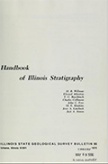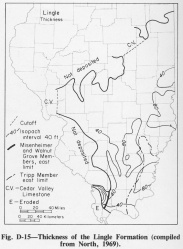Historical:Alto Formation
Lithostratigraphy: Hunton Limestone Megagroup >>Alto Formation
Chronostratigraphy: Paleozoic Erathem >>Devonian System >>Middle Devonian Series
Allostratigraphy: Kaskaskia Sequence
Authors
Charles Collinson and Elwood Atherton
Name Origin
The Alto Formation (Savage, 1920, p. 168-178), which overlies the Lingle Formation in southwestern Illinois, is named for Alto Township, Union County.
Type Section
The type section of the Alto Formation is located in Alto Township, Union County along a creek (cen. N 1/2 NE NE 34, 11S-2W).
Correlation
Although Savage (1920) and Workman and Gillette (1956) believed the Alto extended under the oldest part of the New Albany Shale, Weller (1940) and North (1969) interpreted both the Lingle and Alto as grading laterally into the New Albany. North correlated the Alto with the upper part of the Sweetland Creek Shale in the deep part of the Illinois Basin, but Collinson et al. (1967a) interpreted the uppermost conodont faunas of the Blocher Shale, below the Sweetland Creek, as Upper Devonian in age, in which case both the Alto and the part of the Lingle Formation above the Howardton Member are probably equivalent to the Blocher.
Extent and Thickness
The Alto Formation is in essentially the same area as the Misenheimer and Walnut Grove Members of the Lingle Formation (fig. D-15). It is as much as 100 feet thick.
Description
The lower part of the Alto consists of dolomitic and calcareous shale and siltstone; the shale resembles the Misenheimer. The upper part of the Alto Formation is silty, cherty, gray to dark gray dolomite that grades from coarsely crystalline at the top to finely crystalline at the base. White, gray, and black chert nodules are abundant.
Fossils
On the basis of its few macrofossils (Devonochonetes sp., Reticularia laevis and Mucrospirifer mucronatus), Savage assigned the Alto to the Upper Devonian, but the conodont fauna (Orr, 1964), which includes Polygnathus cristata, relates the Alto to the uppermost Middle Devonian (Collinson et al., 1967a).
References
COLLINSON, CHARLES, L. E. BECKER, G. W. JAMES, J. W. KOENIG, and D. H. SWANN, 1967a, Illinois Basin, in International symposium on the Devonian System: Alberta Society of Petroleum Geologists, v. 1, p. 940-962; Illinois State Geological Survey Reprint 1968-G.
NORTH, W. G., 1969, Middle Devonian strata of southern Illinois: Illinois State Geological Survey Circular 441, 45 p.
ORR, R. W., 1964, Conodonts from the Devonian Lingle and Alto Formations of southern Illinois: Illinois State Geological Survey Circular 361, 28 p.
SAVAGE, T. E., 1920, Devonian formations of Illinois: American Journal of Science, v. 49, p. 169-182.
WELLER, J. M., 1940, Geology and oil possibilities of extreme southern Illinois: Illinois State Geological Survey Report of Investigations 71, 71 p.
WORKMAN, L. E., and TRACEY GILLETTE, 1956, Subsurface stratigraphy of the Kinderhook Series in Illinois: Illinois State Geological Survey Report of Investigations 189, 46 p.
ISGS Codes
| Stratigraphic Code | Geo Unit Designation |
|---|---|

